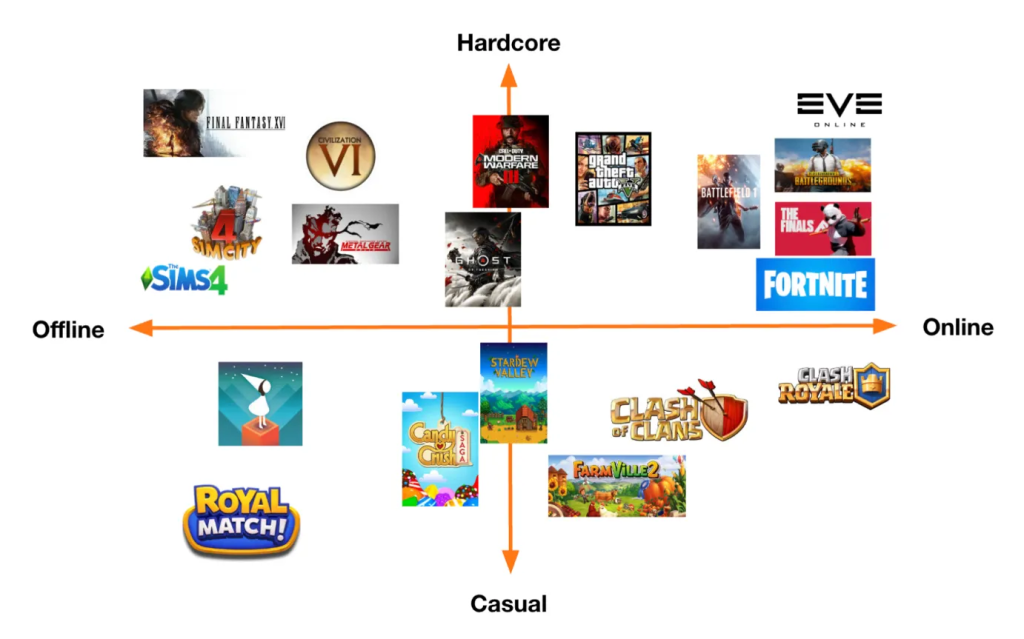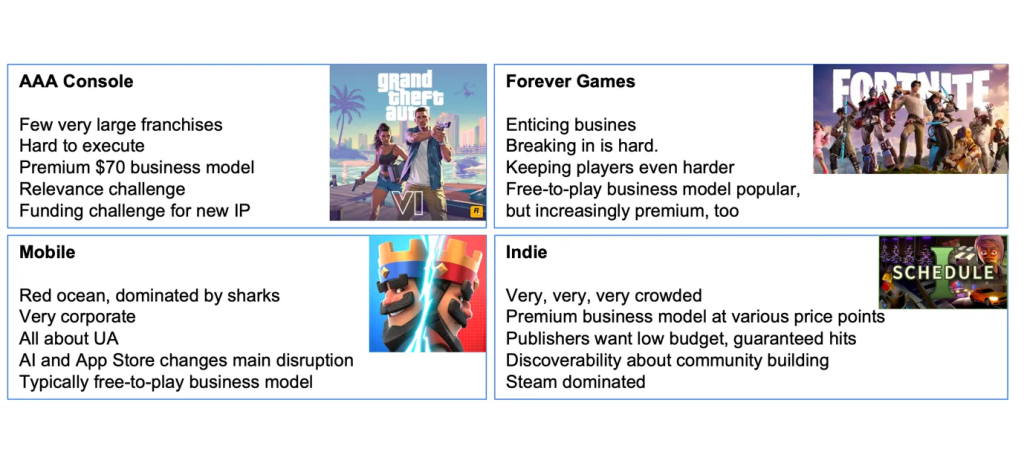My hope for 2026 is that people begin to wake up from the algorithmic torpor that has rendered so many things utterly mediocre. This year I want to work with organizations who believe that we can change this. We’re designing for ranking algorithms and User Acquisition funnels, that’s not how we continue to build a culture.
Sometimes, Players are being treated like tourists in big cities. They walk where it has been decided they should walk, consuming content. I’ve seen this especially in mobile free-to-play, where games are being used as advertising platforms for other games. Consequently, people drift from one insignificant, compromised experience to the next without much thought. Sometimes these games make lots of money in a short time, out of compulsive behaviors. Who will remember them in 5 years?
In a heavily “product-managerized” sector, KPIs become goals for projects to be greenlighted and continue: indicators are more important than meaning. We look at numbers and “kill” projects more than work properly on visions. Optimization takes priority on live operation, we either get that numbers or we just stop believing in what we worked heavily on. We treat our games like McKinsey consultants would, and that’s why every new game feels exactly the same.
Digital storefronts do not curate content, leaving everything to algorithms that make decisions based on the common denominator. 90%+ of mobile game ads today are freaking AI slop, because that works within this system. Because misleading ads are not just allowed, they are “best practices”. Marketing for mobile has become finding players for your game, and not finding games for your players as it should be.
This inevitably leads to workplace exploitation. Because if the end customer cannot appreciate the work behind the scenes nor see any entertaining vision, our touch can never be properly recognized. If we are led by data reports and benchmarks instead of creativity, how can we really do our job?
Anyone capable of spinning a narrative can come along and promise to make games using procedural content generation algorithms and other technologies that mimic human creativity. Because, in the end, when creators are hired to repeat formulas, who cares if it’s a machine doing that? What’s the problem in using cheap performance marketing pipelines, stealing concepts from others? That’s how we stop producing value, losing credibility as artists and makers.
I wish to see the end of this in 2026, or at least the first steps towards it. I wish to work more with people who see mobile games as live entertainment, accessible to everyone where the clients (people who spend) can find real added value in making their purchases because they can find on the other end people who trust in their visions. Liveop game design is a lot about this and game design has many tools under its belt.
Also the AAA crisis has to do with this, in my opinion: quality is treated merely as “content”, something to be consumed, rather than a means to push the industry forward. We are witnessing to the inevitable disease of exploding budgets and the “Mongol Horde” concept: throw more people at it, to put out more and more, but not better. When a game costs $200M+ to make, stakeholders become terrified of “different”, they want “proven”. It’s only exploitation of “established” concepts, without exploration.
AAA games make sense, instead, where they push tech forward, and there’s still lots of innovation to make, not merely new devices, or engines, or whatever. New goals for the players, new progression vectors, new multiplayer interactions. Clair Obscur: Expedition 33, game of the year, is a great example of this. That’s not an indie game: 500 people working on it, professional actors dubbing… that’s a smart way of doing high quality games. AAA should take example from that, not indies. AAA companies should keep an indie-like discovery, exploration for new games before of giving production power. Which is something common in mobile space, as well.
I wish to employ my game design skills with people who understand deeply this, in 2026.
How can we improve this together? Here’s some of my action points, ideas to start from:
1. Reinvent the credits: We must showcase the labor we do, even within the game itself or collaborating truly with content creators. Explain the cost in terms of people and time, even for things that seem simple from the outside. Educate. People have no idea what our work entails; it must be made more visible, and that starts from us. Imagine a “Behind the Scenes” menu tab integrated into the UI that shows the iterations a character’s main actions went through.
* References: Detroid: Become Human has a cool feature where you unlock character models and artwork by using points earned during your choice. On mobile, we have the drawer widget with comments as a proven signifier for comments, why don’t we use that more to engage with our players? Why should we wait for reviews, surveys and comments on social networks? In 2026, I wish to work with games that are always more live.
* Industry Reality: Players currently view games as “magic software” that appears on a screen. Showing the labor could help bridge the empathy gap that currently leads to toxic discourse and crunch culture.
2. Hire fresh talent: we need to bet on people who can understand new audiences because they are part of them, to avoid repeating formulas. We need junior professionals and also seniors from other disciplines: the best games in the history have been made by people with zero experience in games, that’s a fact. They are making great things in indie and AA, we need courage and patience. Some of the most influential designers came from architecture, film, or board games. We need experts to guide and avoid pitfalls, but also space for new energies to create the playgrounds of tomorrow.
* The Statistic: In recent years, the industry has skewed heavily toward specialization. According to some industry reports, nearly 60% of job openings in mid-to-large studios now require 5+ years of direct game industry experience. By locking out “outsiders” and juniors, we are effectively inbreeding our ideas. We need a new perspective to break the loops.
3. Develop European tech: the recent success of Nex Playground in the US (third most sold console, beating Xbox in November) is a clear message that there’s room of innovation on simple and cheaper consoles. A console with the computational power of a PS3 beating the last gen, could you imagine that?
We need to invest in our own structures, and games are the perfect excuse to push technologies forward. We need our platforms, and infrastructure. I dream of a European Nintendo, with the clear mission to onboard new generations in high quality but more accessible consoles. New gen consoles are too complicated for new audiences (11-13, pre-teens in the “age of obsession”, as game designer and author Jesse Schell used to say).
* The Data: While PS5 and Xbox Series X/S battle for the “hardcore” 18-35 demographic, there is a massive vacuum in the “Tween” (11-13) and family market.
* The Opportunity: Nintendo currently owns that space almost exclusively. If Europe, which has incredible hardware engineering talent in Germany, France, and the Nordics, could create a hardware-software ecosystem that prioritizes accessibility over teraflops, it could disrupt the “arms race” that is currently bankrupting studios.
Much more can be done, also in the field of working rights and more fair bonus structures. This year I want to use this platform to connect with like-minded people, with a real desire of changing things.
These are my wishes for 2026. Have a great year everybody!





